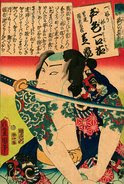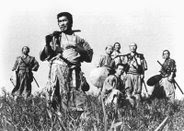
Rick Neuheiser made his return to college football and UCLA tonight one to remember. Neuheiser didn't inherit a football powerhouse with the Bruins, competitive each year-sure, but powerhouse-hardly. UCLA lost four senior starters to injury during the game. Their two would be starters at quarterback are both injured, and if you watched the first-half of the Bruins' quarterback Kevin Craft (a junior-college transfer) performance, you would have cut the tv off after he threw his third interception (Craft had four INT for the game) to save yourself from watching a SEC team destroy the young Californians. But you would have missed another game of epic proportions (and importance) in this wonderful opening weekend of college football. Besides, what else was there to watch?
As the second half of the game produced a total 180 of the young Bruins' QB, as Craft confidently moved the Bruins down the field and made completions instead of interceptions, he had an air of confidence as he made pass after pass. Throughout the second-half, the announcers mentioned a few words that caught in my mind: rhythm passing, precision, engineered offense. The spotlight of course will be on the quarterback's story; how we watched him develop as a leader during this one game, but to this, I would have to disagree.
Coaching the West Coast Offense and the System, not the player
What I noticed as the difference between the first-half Kevin Craft and the second-half Kevin Craft was the difference in the coaching strategy. In the first-half, Craft had five receivers to choose from, and took numerous attempts at fifteen plus yard passes, the result-he floated the ball (reminiscent of South Carolina's Tommy Beecher in his performance against NC State last Thursday night) and the Tennessee secondary made him pay for it with interceptions and points on the board. In the second-half, Craft had only three receivers to choose from, the offensive strategy laid-out by Norm Chow was text-book Bill Walsh "West-Coast" offense: short-timed passes using the field horizontally and creating a rhythm which allowed the Bruins' defense some well deserved rest and kept the Volunteers' defense frustrated.
The transformation here was not with the quarterback, but with the coaches. In the first-half Chow and Neuheisel went with the flashier albeit higher-risk option of going for the deep receiver (San Diego Coach Don Coryell's interpretation of Sid Gilman's "West Coast" offense) which resulted in nothing more than punishment and frustration for the Bruins' side-lines and young quarterback. The change in the second-half was to more precise and engineered short passes (Walsh's interpretation of Gilman's air-attack). In 1971, as the offensive-coordinator with the Cincinnati Bengals, Bill Walsh took the woobly, floater throwing Virgil Carter's weaknesses and turned them into an advantage by limiting the number of receivers Carter had to choose from and by using his seemingly weak arm (at long distances) and using his arm to shorter, more precise passes (less than 12-yards). Carter's pass-rating went from bottom of the barrell to a league leading 62.2%. Which as we watched tonight worked for Kevin Craft as well. And if the Gamecocks wish to continue with Tommy Beecher (although it may seem that Chris Smelley has won the job) Coach Spurrier needs to use Beecher's "talents" and tweek the system of his air attack to fit Beecher. If not, the SEC secondaries the Gamecocks face this season will do much more harm than the slower, State defense they faced last Thursday.
Photo of Elise, former SI Cheerleader of the Week, and her Bruins cheerleading friends courtesy of Sports Illustrated







No comments:
Post a Comment